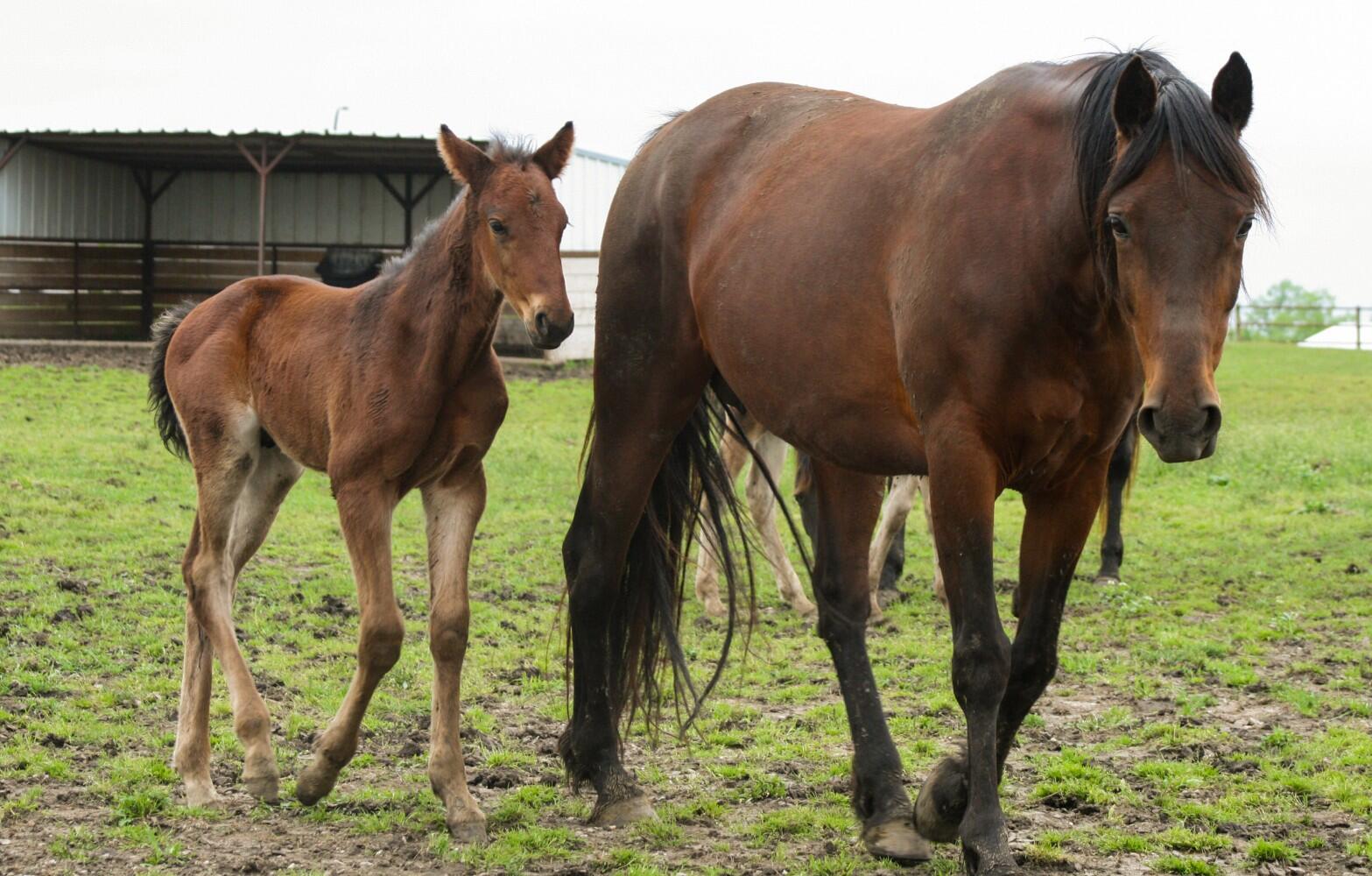Care for farm babies flourishes with COVID-19 modifications

URBANA, Ill. – Life is unpredictable during foaling season, in the best of times. When a pregnant horse is due to give birth, foaling attendants are on call 24 hours a day.
In the case of the University of Illinois horse farm, the 70-80 students enrolled in FoalWatch sign up for all-night shifts on the farm, ready to assist veterinarians and mama horses. But when COVID-19 hit, all that changed.
“When everyone was quarantining and staying at home, we had no option but to have students watch through the cameras we set up in each stall,” says Amy Marroquin, 2020 College of Agricultural, Consumer and Environmental Sciences (ACES) graduate and teaching assistant for FoalWatch.
Farm manager Molly Baldes still attended each birth in person this spring, providing peace of mind to private clients who utilize the farm’s foaling services.
“We are still awaiting the last mare to foal, but even with COVID-19, the staff here managed to deliver 24 out of 24 live foals so far,” Baldes says. “I attribute that feat to luck, the hard work of everyone at the farm, as well as the University of Illinois Veterinary Teaching Hospital for those foals who required more extensive medical care.”
The Illinois horse farm has been part of the university from its earliest days, raising horses to work the extensive farm facilities south of campus and educating countless animal sciences and veterinary students along the way. Now, the farm provides foaling and breeding services to private clients, and continues to provide hands-on learning opportunities for students.
“We use our horses to teach in a very experiential manner, as students enrolled in Horse Management get to teach basic ground handling and manners to our young weanling foals. This is a unique and very popular teaching method which adds both skills to our students and value to our horses which come out of the class with excellent manners and greater marketability,” says Kevin Kline, professor in the Department of Animal Sciences in ACES. “We also teach about the use of tack and equipment in riding and driving horses with live demonstrations of saddling, hitching and driving our more experienced horses, which is also a rather unique opportunity.”
Rodney Johnson, head of the department, adds, “Our equine sciences courses are extremely popular. Many students say FoalWatch, in particular, is one of their most memorable experiences in college. Getting to be there, right next the horses as they’re giving birth, makes a big impact on people. It’s something many of them have never seen before.”
Twenty four horses make up the permanent herd, but temporary boarders and all of this spring’s foals have swollen the herd to 65. With staff numbers still down due to the stay-at-home order, the workload is significant.
“This job requires a lot of labor and hands, but since COVID-19 hit, we have tried to minimize the number of people on-farm. It hasn't been easy, that's for sure, but it has been manageable,” Marroquin says. “And here at the horse farm, we never shy away from a challenge.”
Down the road a bit, the beef farm on Urbana’s campus is stepping up to the challenge as well. Despite campus’ early-March directive for all student employees to stay home, calving season went off without a hitch. All told, 32 Black Angus calves joined the herd during the shutdown.
Beef farm manager Miles Redden brought student workers back to the farm as soon as it was safe.
“All of our employees are essential. Each one fills a critical role in providing for the health, safety, and wellbeing of our animals. We don’t have a choice when it comes to maintaining our farms and animals,” Redden says.
For summer, Redden is bringing even more student workers on to help with daily maintenance on the farm. They, along with permanent employees, will stagger start times, split shifts, and keep as much distance between themselves as possible.
Johnson says student workers not only help keep the farms running, they gain real-world experience in all aspects of farm management, making them highly sought-after in the industry after graduation.
“It’s just one of the many experiential learning opportunities we offer,” he says.
The Urbana herd is one of three beef herds owned and maintained by the college. Two others, at the Orr Beef Research Center and at Dixon Springs Agricultural Center, round out the largest research cow-calf operation east of the Mississippi.
The herds are critical to beef research programs in the Department of Animal Sciences, which center on reproductive health and nutrition. Although some planned research projects were temporarily suspended due to the shutdown, some research was approved as essential due to the seasonality of the work.
“We had grazing projects that were scheduled to begin in April and May and breeding season at the Urbana and Orr beef farms begins in May also,” says Dan Shike, associate professor in the department. “We were able to get approval to begin these projects as scheduled, but we accomplished that with fewer graduate students than normal. Those students followed the recommended guidelines to ensure safety of all staff and students.
“The graduate students, as well as farm staff and student workers have given their all to keep farm operations and essential research moving forward.”
Whether or not classes will allow for hands-on farm experiences this fall, animal sciences students can be assured they’ll learn at least one key lesson: the work continues, no matter what.